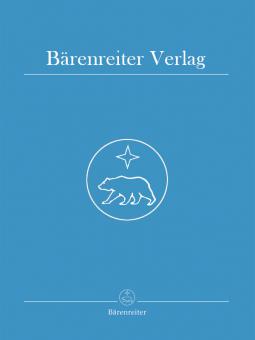Leoš Janáček
The Diary of One Who Disappeared
for Tenor, Alto, Three Female Voices and Piano
Leoš Janáček
The Diary of One Who Disappeared
for Tenor, Alto, Three Female Voices and Piano
- Compositor Leoš Janáček
- Editor Jiří Zahrádka
-
Dificultad
- Editorial Bärenreiter Verlag
- Nº de pedido BA9575
plazo de entrega 1-3 días laborables
IVA incluido.,
Más gastos de envío
No disponible en todos los países. Leer más
Descripción de la:
> First Urtext edition with a detailed Foreword (Cz/Eng/Ger) and Critical Commentary (Eng) by the editor
> Singing translations in German (by Max Brod) and English (by Bernard Keefe)
> Numbers 9 to 11 which include the alto and three female voices also available online
Janácek's intimate chamber-music drama about the passionate love of a simple farm boy for a beautiful gypsy girl is one of his great vocal masterpieces.
This cycle of 22 songs for tenor (an alto and three female voices are added in three numbers) was composed on a setting of poems that were published anonymously. It was not until 80 years later that their author was identified as the regional poet and writer Ozef Kalda. The cycle also contains theatrical elements, such as the alto entrance and exit cues and lighting effects. Composed in 1917-19, the 'Diary' was premièred in Brno in 1921 from a manuscript prepared by Gustav Homola.
The same manuscript served as a basis for the first edition which was issued by the Brno publisher Oldrich Pazdírek in 1921 as well as for this current first Urtext edition.
> Singing translations in German (by Max Brod) and English (by Bernard Keefe)
> Numbers 9 to 11 which include the alto and three female voices also available online
Janácek's intimate chamber-music drama about the passionate love of a simple farm boy for a beautiful gypsy girl is one of his great vocal masterpieces.
This cycle of 22 songs for tenor (an alto and three female voices are added in three numbers) was composed on a setting of poems that were published anonymously. It was not until 80 years later that their author was identified as the regional poet and writer Ozef Kalda. The cycle also contains theatrical elements, such as the alto entrance and exit cues and lighting effects. Composed in 1917-19, the 'Diary' was premièred in Brno in 1921 from a manuscript prepared by Gustav Homola.
The same manuscript served as a basis for the first edition which was issued by the Brno publisher Oldrich Pazdírek in 1921 as well as for this current first Urtext edition.

